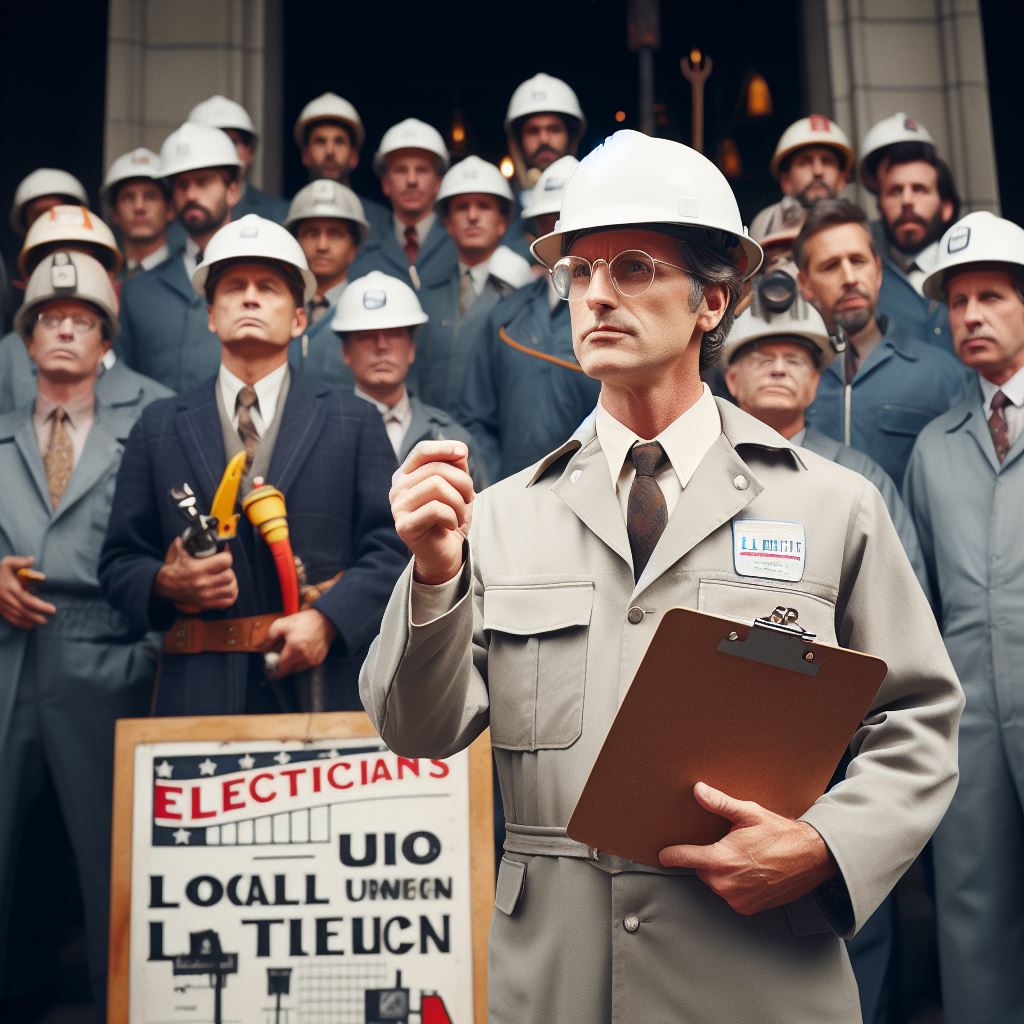Introduction
Unions play a pivotal role across professions, championing workers’ rights, fair wages, and providing a unified voice.
This section delves into the intricate realm of electricians’ unions in the UK, where their significance unfolds.
These unions are not merely entities; they are advocates for fair working conditions, embodying the power of collective bargaining and serving as vehicles of empowerment for electricians.
The purpose of this blog post is twofold: firstly, to illuminate the vital importance of unions in the electrician profession, emphasizing the rights and well-being of its practitioners.
Secondly, it aims to provide a nuanced exploration of the specific landscape of electricians’ unions in the UK.
This comprehensive guide is tailored for electricians navigating their careers in a collaborative framework and individuals intrigued by the dynamic interplay of unions within the profession.
As we journey through the intricacies of electricians’ unions, we uncover not only the advocacy for fairness but also the collective strength that shapes the very fabric of the profession in the United Kingdom.
Overview of Electricians’ Unions
A union is a collective organization that protects workers’ rights and interests, ensuring fair treatment.
Electricians’ unions play a crucial role in advocating for the rights and well-being of electricians.
Joining an electricians’ union offers numerous benefits, including job security, fair wages, and improved working conditions.
Benefits of Joining an Electricians’ Union
1. Job Security
- Being a part of an electricians’ union provides job security through collective bargaining agreements.
- Unions negotiate fair employment terms, protecting electricians from unfair terminations or layoffs.
- Unions also ensure that electricians receive fair and equal treatment in the workplace.
2. Fair Wages
- Electricians’ unions strive for fair wages by negotiating with employers for appropriate compensation.
- Unions address wage disparities and work towards establishing industry-standard pay scales.
- Collective bargaining agreements help ensure that electricians receive competitive salaries for their skills and expertise.
3. Working Conditions
- Unions advocate for safe and healthy working conditions for electricians.
- They fight against hazardous work environments and press for proper safety protocols.
- Through the union’s collective voice, electricians can voice concerns and seek improvements in working conditions.
4. Legal Support
- Electricians’ unions provide legal assistance and representation to their members.
- In case of workplace disputes, unions offer guidance and support throughout the resolution process.
- Union representation ensures that electricians have someone fighting for their rights and interests.
5. Training and Education
- Unions often offer training programs and continuing education opportunities for electricians.
- These programs help members update their skills, stay current with industry advancements, and enhance career prospects.
- Electricians’ unions prioritize the professional development of their members, improving their overall employability.
6. Collective Voice
- Being part of a union gives electricians a platform to voice their concerns collectively.
- Unions actively involve their members in decision-making processes that affect their working conditions.
- Through collective action, electricians can address workplace issues, ensuring their opinions are heard and valued.
Electricians’ unions play a vital role in safeguarding the rights, interests, and welfare of electricians.
Joining a union offers electricians job security, fair wages, improved working conditions, legal support, and training opportunities.
Through collective action, electricians can advocate for their rights and create a better working environment for themselves and their colleagues.
Overall, electricians’ unions are essential for electricians to secure their rights and enhance their professional growth and well-being.
Read: Day in the Life of a UK Auto Mechanic
Personalized UK Career Consulting
Receive tailored career guidance designed just for you. Get actionable steps and expert support to boost your career in 1-3 days. Take control of your career now.
Get StartedMajor Electricians’ Unions in the UK
Electricians are essential professionals in the UK, and their work is crucial for the smooth functioning of homes, businesses, and industries.
To ensure their rights and interests are protected, electricians form unions which negotiate on their behalf.
In this section, we will provide an overview of the major electricians’ unions in the UK, discuss the criteria for joining each union, and explore the differences and similarities between them.
1. Unite the Union
- This is the largest trade union in the UK, representing various industries including electricians.
- To join, individuals must work as electricians or related trades and pay monthly membership fees.
- Unite offers a range of services to its members, including legal representation, collective bargaining, and campaigning for improved pay and conditions.
2. The Electrical Contractors’ Association (ECA)
- ECA represents electrical engineering and installation businesses, including electricians.
- Individual electricians can join as affiliate members if they work for an ECA member company.
- ECA provides training, technical support, and industry advice to its members.
3. The Joint Industry Board (JIB)
- JIB represents electrical contracting companies and electricians in the UK.
- Electricians can become JIB members through their employers, who must be registered with the JIB.
- JIB ensures its members receive fair pay, benefits, and training opportunities.
4. The Union of Shop, Distributive, and Allied Workers (Usdaw)
- Usdaw is primarily a retail trade union but also represents electricians in certain sectors.
- Electricians who work in retail, warehousing, or distribution can join Usdaw.
- Usdaw advocates for better pay, job security, and health and safety standards for its members.
5. The Communications Workers Union (CWU)
- CWU represents workers in the communication industry, including electricians in telecommunication companies.
- Electricians in the telecommunications sector can join CWU to access its services and benefits.
- CWU campaigns for fair pay, improved working conditions, and job protection.
While these unions serve electricians’ interests, they differ in their membership criteria and focus areas.
Unite the Union, ECA, and JIB specifically cater to electricians’ needs and work towards improving their pay, conditions, and training opportunities.
On the other hand, Usdaw and CWU represent a wider range of industries but still extend their support to electricians working within those sectors.
In terms of services, Unite, ECA, and JIB provide legal representation and assist with collective bargaining to ensure electricians receive fair treatment.
They also offer training programs to enhance skills and knowledge.
Usdaw and CWU prioritize improving pay, job security, and health and safety standards but may have fewer specific services tailored explicitly for electricians.
Therefore, the major electricians’ unions in the UK, such as Unite the Union, ECA, JIB, Usdaw, and CWU, play a vital role in representing and advocating for electricians’ rights.
Each union has its own membership criteria and areas of focus, but ultimately, they work towards improving pay, conditions, and opportunities for electricians across the country.
By joining these unions, electricians can benefit from collective strength and support, ensuring a better future for their profession.
Read: Career Paths for Electricians in the UK

Services and Support Offered by Electricians’ Unions
Electricians’ unions in the UK provide a range of services and support to their members, ensuring their rights and interests are protected.
Your Dream Job Starts with a Perfect CV
Get a tailored CV and cover letter that captures your unique strengths and stands out in your industry. Let us help you make an unforgettable first impression.
Get StartedHere are some of the specific benefits offered:
Legal Representation
- Electricians’ unions offer legal representation to their members in case of employment-related issues.
- This includes assistance in navigating complex employment laws and regulations.
- Expert advice and guidance are provided to ensure fair treatment and protection of members’ rights.
Contract Negotiations
- The unions assist electricians in negotiating favorable employment contracts with their employers.
- They provide support and guidance throughout the negotiation process.
- Union representatives have experience in employment law and can help secure better terms and conditions.
Resolving Workplace Disputes
- If a dispute arises between an electrician and their employer, the union steps in to mediate.
- Union representatives work to resolve conflicts and ensure a fair outcome for all parties involved.
- This support includes representation during disciplinary proceedings or grievances.
Training and Professional Development Opportunities
- Electricians’ unions offer various training programs to enhance members’ skills and knowledge.
- These programs help electricians stay up-to-date with industry standards and technological advancements.
- Members also gain access to professional development opportunities, such as workshops and seminars.
Health and Safety Support
- Unions prioritize the health and safety of their members.
- They provide guidance on health and safety regulations and promote safe working practices.
- In case of workplace accidents or hazards, unions offer support and representation.
Collective Bargaining
- Electricians’ unions negotiate collective agreements on behalf of their members.
- These agreements ensure fair wages, working hours, and other employment conditions.
- Members benefit from the strength of collective bargaining in securing favorable terms.
Networking and Community
- Unions facilitate networking opportunities within the electrician community.
- Members can connect with peers, share experiences, and build professional relationships.
- This sense of community fosters solidarity and support among electricians.
Overall, electricians’ unions in the UK offer a comprehensive range of services and support to their members.
From legal representation and contract negotiations to training and professional development opportunities, these unions ensure their members receive fair treatment and have their best interests protected.
By joining an electricians’ union, individuals can benefit from the collective strength and expertise of the union in addressing workplace issues and advancing their careers.
Read: The Impact of Tech on UK Electricians
Evolution and Impact of Electricians’ Unions
Electricians’ unions in the UK have a long and interesting history that has evolved over the years.
These unions have played a significant role in shaping the profession and bringing about positive changes.
Trace the history and evolution of electricians’ unions in the UK
Electricians’ unions trace their roots back to the mid-19th century, when the electrical industry began to emerge as a distinct trade.
As the demand for electricity increased, so did the need for skilled electricians.
This led to the formation of professional associations to protect the interests of electricians and ensure fair wages and working conditions.
Landmark achievements and changes brought about by these unions
One of the landmark achievements of electricians’ unions was the establishment of the Joint Industry Board (JIB) in 1969.
The JIB acted as a regulatory body, setting standards for training, qualifications, and employment conditions.
This was a significant step towards enhancing the professionalism and reputation of electricians in the UK.
Electricians’ unions have also been instrumental in improving safety standards within the industry.
Optimize Your LinkedIn for Success
Boost your LinkedIn profile with a professional bio, keyword-rich headline, and strategic recommendations that attract recruiters. Stand out from the crowd and get noticed.
Optimize NowThrough collective bargaining, unions have successfully advocated for the implementation of safety regulations and the enforcement of strict safety protocols.
As a result, the number of accidents and fatalities in the electrical industry has significantly decreased over the years.
These unions have also played a crucial role in influencing industry regulations.
By representing the collective voice of electricians, unions have been able to advocate for fair and equitable laws and regulations that protect the rights and interests of their members.
This has led to improvements in wages, working hours, and legal protections for electricians.
Furthermore, electricians’ unions have been at the forefront of promoting ongoing professional development and training opportunities.
They have pushed for mandatory training and apprenticeship programs to ensure that electricians have the necessary skills and knowledge to meet the evolving demands of the industry.
This has not only benefited electricians but has also safeguarded the quality of electrical work carried out in the UK.
The impact of electricians’ unions on the profession as a whole, including improvements in safety standards and industry regulations
The impact of electricians’ unions extends beyond the profession itself.
By advocating for fair wages and working conditions, these unions have contributed to reducing income inequality and improving the overall well-being of electricians and their families.
Additionally, the improved safety standards and industry regulations brought about by these unions have benefited the general public by ensuring that electrical work is carried out safely and to a high standard.
Therefore, electricians’ unions in the UK have played a vital role in the evolution and development of the electrical profession.
Through their collective efforts, these unions have achieved landmark achievements and brought about positive changes.
From improving safety standards to influencing industry regulations, these unions have made a lasting impact on the profession as a whole.
Electricians’ unions continue to be an essential force in advocating for the rights and interests of electricians, ensuring the sustainability and growth of the industry.
Read: Electrical Contracting: A UK Business Guide
Challenges and Controversies Surrounding Electricians’ Unions in the UK
Electricians’ unions in the UK have faced several challenges and controversies that have shaped their effectiveness, policies, and influence on pricing and competition within the industry.
It is crucial to address these issues to understand the dynamics of the union and its impact.
1. Lack of Representation
One of the main challenges faced by electricians’ unions in the UK is the lack of representation for all electricians.
Not all electricians are members of unions, which limits the unions’ ability to advocate for the entire profession effectively.
2. Inclusion of Non-Qualified Electricians
Another controversy surrounding electricians’ unions is the inclusion of non-qualified electricians in their ranks.
This has drawn criticism from qualified electricians who argue that it undermines their expertise and reduces the union’s overall credibility.
3. Balancing the Interests of Employers and Employees
Electricians’ unions often face the challenge of balancing the interests of their members, who are employees, and the employers within the industry.
This delicate balance can lead to conflicts and controversies over issues such as wages, working conditions, and labor rights.
4. Resistance to Technological Advances
The rapid advancement of technology in the electrical industry poses challenges to electricians’ unions.
Some unions have been resistant to embracing these technological changes, leading to criticism that they are hindering progress and competitiveness within the industry.
5. Politicization of Union Activities
Electricians’ unions, like many labor unions, can become politicized, aligning themselves with specific political ideologies or parties.
This can lead to controversies as their actions and policies may be influenced by political agendas, rather than solely focusing on the interests of their members.
6. Addressing Criticisms
Despite the challenges and controversies, electricians’ unions have also faced criticisms regarding their effectiveness and policies.
Some argue that unions can be too rigid in their approach, causing delays and hindering productivity on construction sites.
Others claim that unions focus too heavily on individual worker rights at the expense of economic growth and job creation.
However, unions also play a vital role in ensuring fair wages, safe working conditions, and protecting workers’ rights.
They provide a collective voice for electricians, who may not have the same bargaining power as employers when addressing workplace issues or negotiating contracts.
Influence on Pricing and Competition
Electricians’ unions have a significant influence on pricing and competition within the industry.
Through collective bargaining, unions negotiate wages and benefits packages for their members.
This can lead to higher labor costs, which may impact pricing for electrical services and potentially reduce the industry’s competitiveness.
However, unions can also help create a level playing field by setting industry standards for wages, working conditions, and skills.
This ensures fair competition and prevents undercutting, protecting both electricians and consumers from unscrupulous practices.
Electricians’ unions in the UK face various challenges and controversies that impact their effectiveness, policies, and influence on pricing and competition.
By addressing criticisms and navigating through these challenges, unions can continue to play a crucial role in advocating for the rights and interests of electricians in the industry.
It is essential for unions to adapt to technological advancements, represent the entire profession, and strike a balance between the interests of employers and employees.
Ultimately, a well-functioning electricians’ union can contribute to a fair and competitive electrical industry in the UK.
Conclusion
Electricians’ unions play a vital role in the UK, providing numerous benefits, services, and impacts for their members.
By joining an electricians’ union, professionals can gain better protection and representation in their profession.
The union ensures fair wages, safe working conditions, and professional development opportunities.
Additionally, members can access various support services, including legal counsel, pension schemes, and networking opportunities.
The impact of electricians’ unions extends beyond individual benefits, as they work collaboratively to advocate for the rights and interests of all electricians.
Considering all these advantages, it is highly encouraged for readers to seriously consider joining an electricians’ union to enhance their career prospects and professional growth.
By becoming a member, electricians can secure their rights, contribute to industry standards, and have a collective voice for a better future in their field.
Joining an electricians’ union is an active step towards safeguarding one’s professional interests and enjoying the benefits of union representation.
[E-Book for Sale]
500 Cutting-Edge Tech Startup Ideas for 2024 & 2025: Innovate, Create, Dominate
$19.99 • 500 Tech Startup Ideas • 62 pages
You will get inspired with 500 innovative tech startup ideas for 2024 and 2025, complete with concise descriptions to help you kickstart your entrepreneurial journey in AI, Blockchain, IoT, Fintech, and AR/VR.




